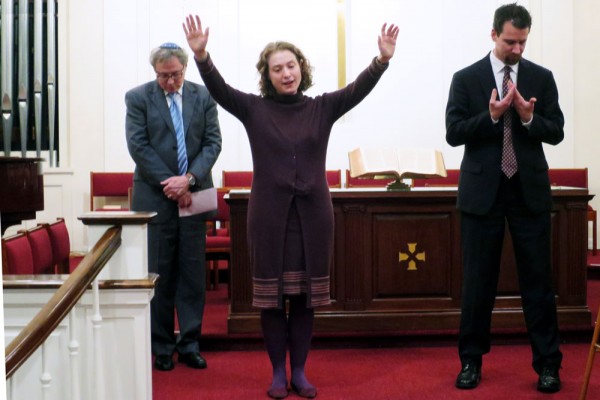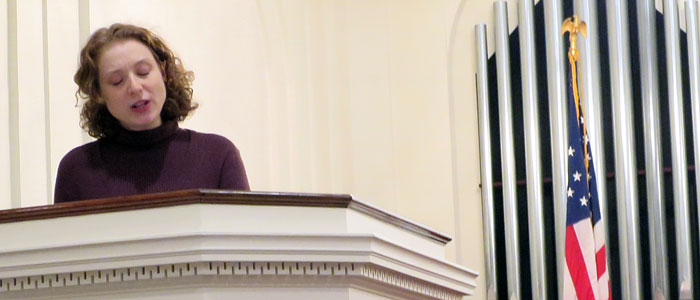To think it all started with a Hanukah party. . .
Twenty-five years ago, Dr. Jeffrey and Janet Weingarten were newcomers to Detroit. Coming from Iowa where Dr. Weingarten had finished his surgical residency, they chose to make their home in Grosse Pointe Woods to be near Jeff’s medical practice. They also fell in love with the beauty and serenity of the Grosse Pointe neighborhoods.
In the spirit of the holidays that first winter, the Weingartens decided to throw a little party and asked the few Jewish neighbors and colleagues they knew to spread the word that they were hosting a Hanukah celebration in their home. Expecting no more than a handful of couples to attend, they were astonished when over 100 people responded to the invitation.
The party that night stirred more than a few new friendships. Those who were there still talk about their delight in learning that there were far more Jewish families living in and near the Grosse Pointes than they ever imagined. Exchanging addresses, the group didn’t take long to organize a committee, name a board of directors and create what would become the Grosse Pointe Jewish Council – the GPJC.
There were 63 founding families in the GPJC in 1989. Today the Council serves 150 families with the goal “to preserve and promote the heritage and traditions of the Jewish religion and culture for the benefit of its membership and the community of metropolitan Detroit’s east side and to offer an educational and social forum for its members.”
Redefining the Metropolitan Detroit Jewish “core”
It should come as no surprise that there are many east siders who have chosen to live outside of what is considered to be the traditional “core” of the Jewish community (defined as the 23 zip codes in southern Oakland County listed in the 2005 Jewish Population Study conducted by Federation). Jewish Detroit has a long history of mobility, and Jews have lived in the five Grosse Pointes for almost a century.
Jewish Detroit’s “core” strength continues to grow from its rich diversity, its communal energy and resources flowing through all corners of the metropolitan area. With the return of NEXTGeners to the city of Detroit, the resurgence of downtown and midtown neighborhoods, the strong presence of the Isaac Agree Downtown Synagogue and the Reconstructionist Congregation of Detroit, GPJC’s numbers have grown and continue to grow. While some members of the GPJC have transplanted themselves from the west side, the majority don’t have west side ties or memories. They have come to Detroit for business and employment opportunities. They include physicians, lawyers and judges in practice downtown or in or near the Grosse Pointes; professors and teachers at Wayne State University and University Liggett School; couples and families with varying identities and needs – all seeking a connection with a Jewish community in a beautiful, well-maintained community on the shores of Lake St. Clair and close to downtown and Nidtown.

Wherever you go, there’s always someone Jewish
“When I tell people that I serve as the rabbi of the Grosse Pointe Jewish Council, the response is almost invariably surprise that there’s a Jewish community in Grosse Pointe,” says Rabbi Ariana Silverman, a resident of Detroit since moving from New York City to Detroit in 2010. “Whenever I get into one of those conversations, the chorus to Wherever you go, there’s always someone Jewish plays in my head. It’s remarkable, in an age when a device in my pocket can instantly send a message to Jews on the other side of the world, we are often unaware of the Jews who live on the other side of town.”
This Spring, Rabbi Silverman taught a class that met in the houses of worship for the Downtown Synagogue, the Reconstructionist Congregation of Detroit and the Grosse Pointe Jewish Council. In any given week, participants could attend at any of the locations. In pairing activities with synagogues in the city, members are starting to join more than one congregation. “We mesh well,” observes Michael Kasky, Past President of GPJC and current Director of Religious Activities. “There is an increasing number of cooperative efforts between the three congregations. While we respect the liturgical differences between our three congregations, we also recognize our shared Jewishness and try to focus on activities in which we all can feel comfortable amid a larger Jewish presence.”
“If there’s a substantive distinction between the Grosse Pointe Jewish Council and most congregations, it is a ‘distinction with little difference,'” according to Mike Kasky. “We call ourselves a Council rather than a congregation in order to be a universal Jewish organization welcoming anyone who has any kind of Jewish affiliation, whether it be religious, cultural, social or family-based. As the years have progressed, the trend for our community has been to become more religiously involved and we’ve been able to provide worship services that are comfortable and meaningful to our members, many of whom are interfaith families or those who don’t have a strong religious background.”
Organized somewhat differently than most congregations, the Grosse Pointe Jewish Council doesn’t own or rent its own building. Instead, they’ve established a relationship with a Grosse Pointe church and rent space and facilities as needed to accommodate the calendar of holidays and religious services, events and life cycle celebrations. The arrangement has become a close working relationship highlighted by a yearly joint Thanksgiving Service officiated by the clergy of both congregations.
“One advantage of not having a building of our own is that many of our get-togethers are held in the homes of our members,” says Rabbi Silverman. At least twice during the summer season, the congregation holds a Saturday morning service at a lakeside home. Two or three times a year there are Family Shabbats combining dinner with a Shabbat service. “Davening in the Deli” also has become a popular Friday night tradition that started a couple of years ago at Uncle Harry’s Kosher-Style Deli and Restaurant in nearby St. Clair Shores.
Another advantage of membership in the Council is the low cost of the annual dues made possible by no building infrastructure to support. GPJC members volunteer their time and effort to perform many of the tasks usually performed by paid staff in larger congregations and Rabbi Silverman, Cantorial Soloist Bryant M. Frank and guest lecturers are compensated by the services they perform or by the hour.
Jewish education is an important priority to the GPJC which operates its own religious school that holds weekly classes in a neighborhood commercial building. The school serves children in elementary and middle school grades. This past year, two of the students celebrated their B’nai Mitzvah.
Times have changed since that first Hanukkah party 25 years ago. Reflecting on the Jewish community of Grosse Pointe, Rabbi Silverman observed, “The GPJC is just one example of how small communities of Jews can provide multiple access points to Judaism while celebrating, praying, mourning, learning and serving together. Jewish life south of 8 Mile is flourishing. Jewish life east of Mack Avenue is flourishing. It is my hope that someday we will say to one another, ‘There are no places in Metro Detroit where Jews aren’t living and serving our city together.’”




